CHAPTER 1: Independence
- by Ritweek Singh
IIT(BHU) Varanasi , India
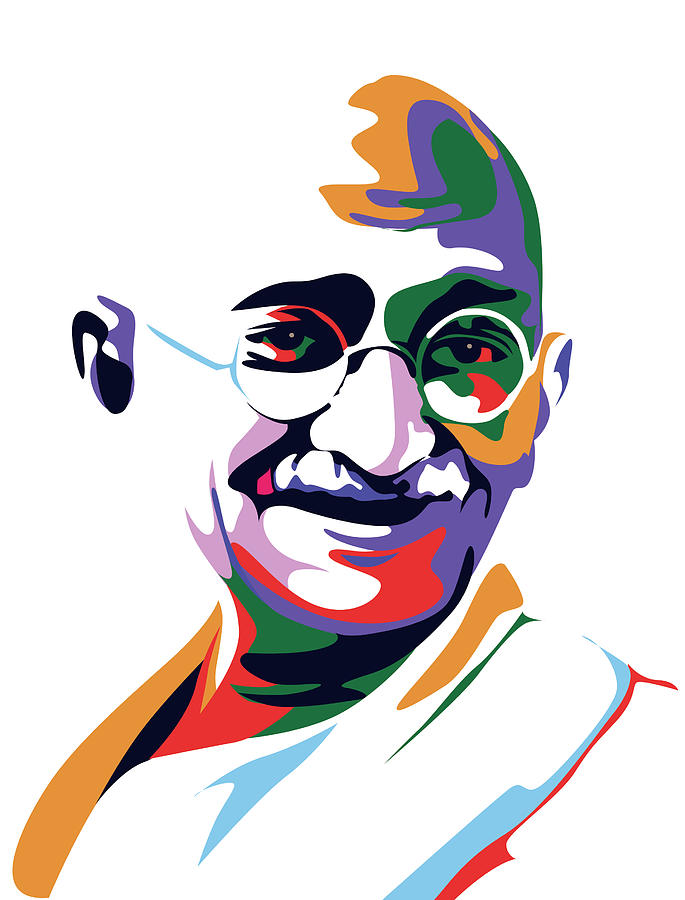 As per Britishers are concerned Gandhi was not much of a threat. He was not a good public speaker and faced serious problems in his initial days as an advocate in the Bombay High court. Thus his sudden success in South Africa and his magnificent return as a hero can raise suspicion.
As per Britishers are concerned Gandhi was not much of a threat. He was not a good public speaker and faced serious problems in his initial days as an advocate in the Bombay High court. Thus his sudden success in South Africa and his magnificent return as a hero can raise suspicion.
It can't be argued, most of his movements had minimal impact on the Raj. I am not going into detail but curious minds can read CBSE class 10th History book: Nationalism in India.
Gandhi surely deserves this title.
We may argue on his efficiency and darker conspiracies but he brought the country together. India was truly a subcontinent, divided by language ethnicity religion and most importantly CASTE.
Before him, congress was just a body comprising of rich, educated and elite of that time. It was when Gandhi became The Mahatma, he brought everyone into the freedom struggle. He became the face of the independence movement. He was one of the first to break through the divide of the Indian caste system which was a very big deal at that time. He gave the principle of secularism. For the first time, rich-poor, Hindu-Muslim, brahmin-shudra all were together following the same man.
Thus he is the father of the nation because he transformed a messed up subcontinent into a country we know today as Akhand Bharat(Including Pakistan, Bangladesh).
INA backed by the axis powers was a feared force. The British were worried as INA has advanced into territories of modern-day Myanmar. Though Bose was never a supporter of democracy. He had war charges on him. Even though hypothetically if he would have returned, India under him would have been either a communist country or dictatorship.
Still, Axis powers lost and so did INA with them.
You may wonder what happened to leaders of INA then. INA had a lot of wealth mostly as gold donated by Indians all over south-east Asia. Bose faked his death and went to Russia via Manchuria. Allegedly he was kept in jail in Russia and later gassed by Stalin. Stalin's daughter claimed she had met Netaji in a Russian prison. The missing gold of INA was going to result in the first scam of India. I would talk about this in detail in Chapter 2: Inferno of this series.
So Gandhi wasn't much of a threat, Bose dead/alive but out of the picture, INA defeated. Then what made British leave. The answer is in the opening image.

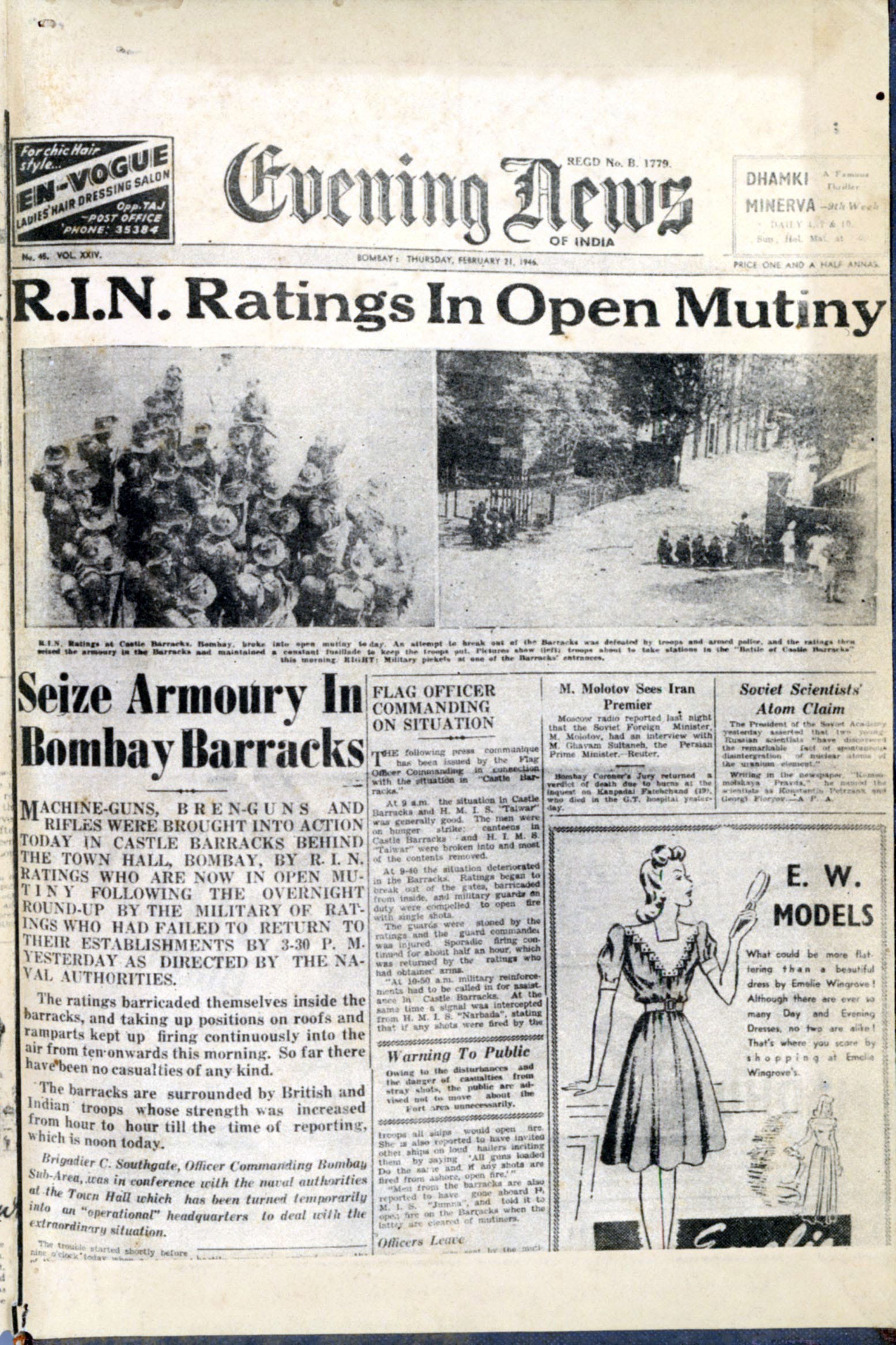
Its a fact that British could not control India without Indian solders. These trials infuriated all Indian solders and resulted in a total strike and subsequent revolt by Indian sailors of the Royal Indian Navy on board ship and shore establishments at Bombay harbour on 18 February 1946. The mutiny spread to other navel bases and then to army and airforce. This was the event British feared the most.
It's fascinating our freedom struggle started with a sepoy mutiny in 1857 and ended by a navel mutiny in 1946.
The difference between 1857 and 1946 was that in 1857 there was no leadership. Common people were not involved or didn't care and all the participating kings were fighting for their kingdoms, for example, most glorified Rani Laxmi Bai for protecting the kingdom of Jhansi not of India as a country.
In contrast, in 1946 each and every person was involved in the freedom struggle, both INA, as well as other political groups such as congress, had a well defined, experienced national leadership. INA though defeated had trained soldiers and enough contacts to acquire weapons. Adding British economy was devastated and they were tired of the WWII.
Thus Britishers were left with only two options
1). Leave India peacefully which they did.
2). Leave India with international humiliation after the bloodiest wars in the history of wars.
Lord Mountbatten, the last viceroy, was told by the British prime minister, Clement Attlee, in March 1947 to negotiate an exit deal with Indian leaders by October; if he could not, Britain would leave India with no deal by June 1948. The decision to speed this up and leave on Aug. 15 was Lord Mountbatten's.
The reason for this haste to leave was because governing India was not a cheap thing and cost British millions of dollars in today's market. And thus on the stroke of midnight on the 15th of August 1947, India got its independence.
Hyderabad also faced the same geographical problem to that of Junagarh. Operation Polo also known as Operation Caterpillar was launched by India. Indian forces face almost no resistance by the nizams army. It was over within 5 days 13 September 1948 – 18 September 1948 and Hyderabad became a part of India.
Dr. B. R. Ambedkar, chairman of the Drafting Committee, presented the final draft of the Indian Constitution to Dr. Rajendra Prasad on 25 November 1949.On th 26th of november 1949 the constitution was adopted.


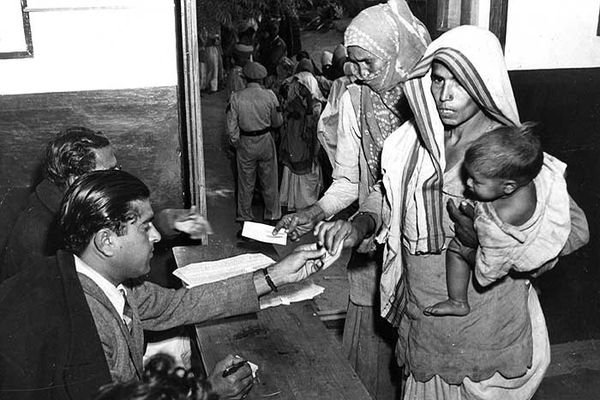
Sukumar Sen

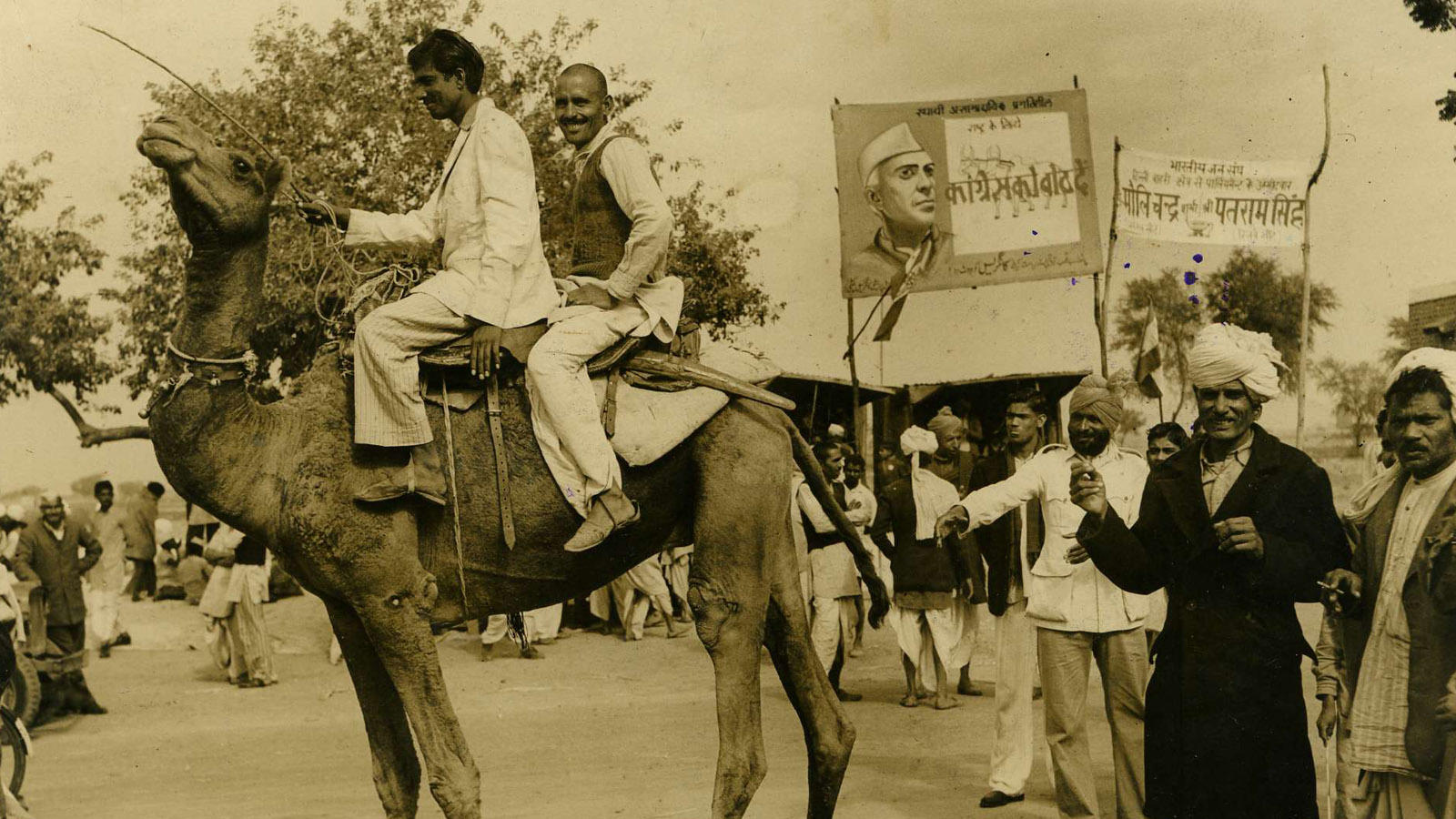
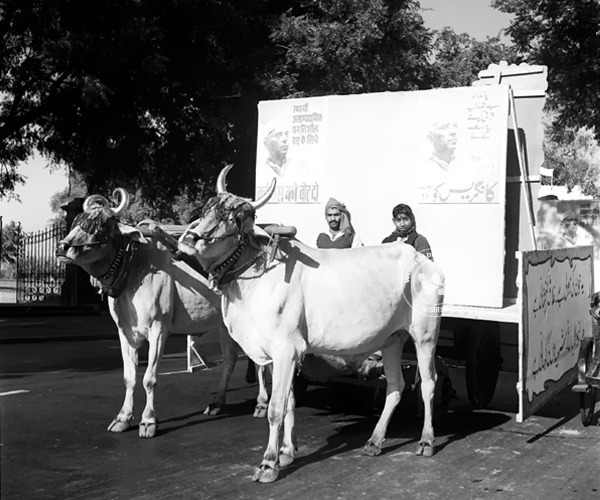

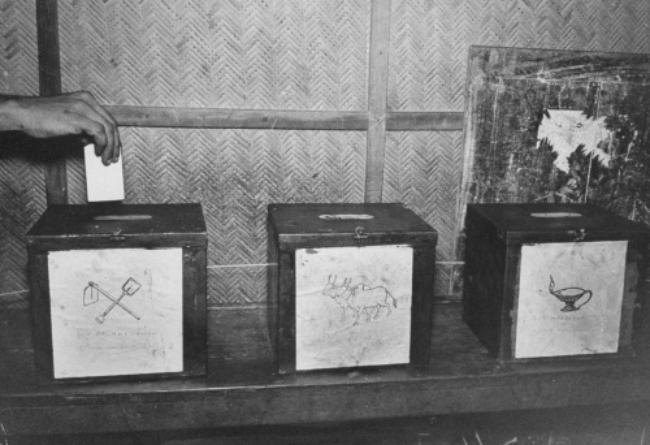

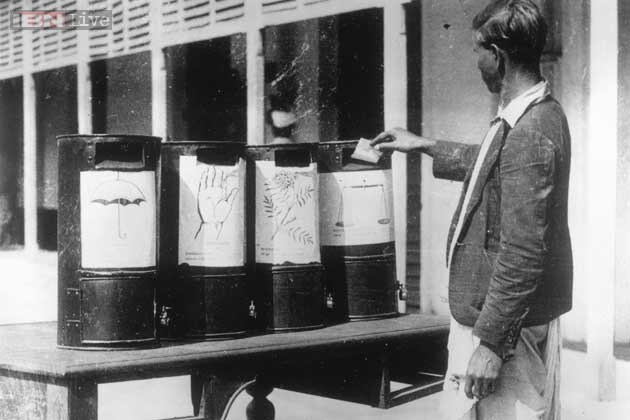

IIT(BHU) Varanasi , India
PART-I :Freedom
"तुम मुझे खून दो मैं तुम्हे आज़ादी दूंगा "
Who gave India Independence?
People give credit to different people, mainly Gandhi and Bose. In my opinion, both must be credited for different reasons and both were necessary for the big picture. So I would just present the facts and give the reader the liberty to interpret. But last straw that broke the camel’s back was this newspaper.
Gandhi:

It can't be argued, most of his movements had minimal impact on the Raj. I am not going into detail but curious minds can read CBSE class 10th History book: Nationalism in India.
Dialogue between British PM Attlee and West Bengal governor Justice PB Chakraborty sometime in 1956
"Toward the end of our discussion I(Justice Chakraborty) asked Attlee what was the extent of Gandhi's influence upon the British decision to leave India. Hearing this question, Attlee's lips became twisted in a sarcastic smile as he slowly chewed out the word, 'm-i-n-i-m-a-l'."Why the "Father of the nation" then?
Gandhi surely deserves this title.
We may argue on his efficiency and darker conspiracies but he brought the country together. India was truly a subcontinent, divided by language ethnicity religion and most importantly CASTE.
Before him, congress was just a body comprising of rich, educated and elite of that time. It was when Gandhi became The Mahatma, he brought everyone into the freedom struggle. He became the face of the independence movement. He was one of the first to break through the divide of the Indian caste system which was a very big deal at that time. He gave the principle of secularism. For the first time, rich-poor, Hindu-Muslim, brahmin-shudra all were together following the same man.
Thus he is the father of the nation because he transformed a messed up subcontinent into a country we know today as Akhand Bharat(Including Pakistan, Bangladesh).
BOSE:
Same dialogue between PM Attlee and Justice Chakraborty
"My direct question to Attlee was that since Gandhi's Quit India Movement had tapered off quite some time ago and in 1947 no such new compelling situation had arisen that would necessitate a hasty British departure, why did they had to leave?"
"In his reply Attlee cited several reasons, the main among them being the erosion of loyalty to the British crown among the Indian Army and Navy personnel as a result of the military activities of Netaji,"
INA backed by the axis powers was a feared force. The British were worried as INA has advanced into territories of modern-day Myanmar. Though Bose was never a supporter of democracy. He had war charges on him. Even though hypothetically if he would have returned, India under him would have been either a communist country or dictatorship.
Still, Axis powers lost and so did INA with them.
You may wonder what happened to leaders of INA then. INA had a lot of wealth mostly as gold donated by Indians all over south-east Asia. Bose faked his death and went to Russia via Manchuria. Allegedly he was kept in jail in Russia and later gassed by Stalin. Stalin's daughter claimed she had met Netaji in a Russian prison. The missing gold of INA was going to result in the first scam of India. I would talk about this in detail in Chapter 2: Inferno of this series.
So Gandhi wasn't much of a threat, Bose dead/alive but out of the picture, INA defeated. Then what made British leave. The answer is in the opening image.
Red Fort trials 1945-46
The mistake that gave India Independence
The British economy was devastated by the war and to India's luck, the Labour Party won the elections in the UK. Still, they were not determined to give India independence. To humiliate INA they organised trials to charge them of war crimes. To exaggerate the humiliation they chose to do the trails in public at Red Fort. After a long time, all groups and parties like INA and Muslim League came together to condemn these trials.
Though Bose was missing, he had created a spark in minds of the british-Indian soldiers. These trails were that wind that transformed the spark into an uncontrolled fire.


Its a fact that British could not control India without Indian solders. These trials infuriated all Indian solders and resulted in a total strike and subsequent revolt by Indian sailors of the Royal Indian Navy on board ship and shore establishments at Bombay harbour on 18 February 1946. The mutiny spread to other navel bases and then to army and airforce. This was the event British feared the most.
It's fascinating our freedom struggle started with a sepoy mutiny in 1857 and ended by a navel mutiny in 1946.
The difference between 1857 and 1946 was that in 1857 there was no leadership. Common people were not involved or didn't care and all the participating kings were fighting for their kingdoms, for example, most glorified Rani Laxmi Bai for protecting the kingdom of Jhansi not of India as a country.
In contrast, in 1946 each and every person was involved in the freedom struggle, both INA, as well as other political groups such as congress, had a well defined, experienced national leadership. INA though defeated had trained soldiers and enough contacts to acquire weapons. Adding British economy was devastated and they were tired of the WWII.
Thus Britishers were left with only two options
1). Leave India peacefully which they did.
2). Leave India with international humiliation after the bloodiest wars in the history of wars.
Lord Mountbatten, the last viceroy, was told by the British prime minister, Clement Attlee, in March 1947 to negotiate an exit deal with Indian leaders by October; if he could not, Britain would leave India with no deal by June 1948. The decision to speed this up and leave on Aug. 15 was Lord Mountbatten's.
The reason for this haste to leave was because governing India was not a cheap thing and cost British millions of dollars in today's market. And thus on the stroke of midnight on the 15th of August 1947, India got its independence.
PART-II: Formation
British always exit in haste leaving chaos behind them whether its 1947 or EU-Brexit of 2020.
This haste to leave cost India millions of lives on both sides of the borders. I won't go much into why partition occurred or who was to be blamed as they are well-known facts now.
Radcliffe Massacre
As we know India was divided on a map by Cyril John Radcliffe. He simply marked the districts with Hindu majority in Indian territory and Muslim majority in Pakistani territory. A district with a population of 100.000 if 70% muslim went to pakistan, but 30,000 hindus are also a significant proportion to be sent to Pakistan . Thus millions of people were forced to migrate. Our newly formed country had to deal with widespread violence and income of millions of refugees. This event still leaves a scar on our country and the horror remains alive within those who have witnessed it.
Princely Tantrums
At the time of independence, the Princely states were free to join India, Pakistan or to remain independent. Out of 565 princely states during 1947, 13 princely states decided to join Pakistan.
Sardar Vallabhbhai Patel who will later become the home minister of Indian Union used all the 4 neeties of Kautilya i.e. Saam, Daam, Dand & Bhed to merge the princely states with the Union.
Only 6 states decided to remain independent, namely Jodhpur, Bhopal, Travancore, Junagarh, Hyderabad & Kashmir. The first three did join the union at the time of independence. However,
the last three princely states created problems. These were technically not part of India at the time of independence.
To be noted Pondichery, Lakshadweep, Andaman&Nicobar Islands, Sikkim, Dadra and Nagar Haveli, Goa & Daman and Diu were also not part of Indian Union in 1947.
Junagarh:
Junagarh was a majority hindu state with a Muslim ruler who wanted to join pakistan. It was surrounded by India by all sides thus its merger was inevitable. People of Junagarh revolted and the supplies were cut by India. thus the maharaja fled with his gold to pakistan and Junagarh became a part of India on 15 September 1947.
Hyderabad:
Hyderabad also faced the same geographical problem to that of Junagarh. Operation Polo also known as Operation Caterpillar was launched by India. Indian forces face almost no resistance by the nizams army. It was over within 5 days 13 September 1948 – 18 September 1948 and Hyderabad became a part of India.
Kashmir:
Kashmir was a majority Muslim state ruled by a Hindu ruler. This was the inverse case of Junagarh. Thus India was forced to remain neutral as this would question its action on Junagarh. On 22 Oct 1947 Pakistan backed militants attacked Kashmir. After this attack then ruler of Kashmir Maharaja Hari Singh asked India for help. India agreed to help only if Hari Singh signed the Instrument of Accession. Till this time Pak militants had reached near Shrinahar. Indian Forces were mobilised and the Shrinagarh Airport was taken under control. Indian army was advancing but in a controversial decision, Nehru took the matter to the UN. A ceasefire was established and a referendum was to be conducted after retrieval of forces from both sides. Forces were never taken back and thus referendum never took place.
Interestingly Article 370 was not yet proposed though in March 1948, Hari Singh made a proclamation by which his council of ministers were to convene a National Assembly based on adult franchise,
to work out a new constitution for Jammu and Kashmir. The Instrument of Accession was signed without any condition. It would later be added by a Presidential Order.{In detail Chapter6}
Assassination of Gandhi
Gandhi was shot three bullets in the chest with a pistol from a close range by Nathuram Vinayak Godse on 30 January 1948. This lead to large scale outrage and banning of the RSS. One can argue that Gandhi would have had unprecedented powers in independent India and could have influenced the general elections. Many possibilities can be imagined with Gandhi alive in independent India but I would leave that for the readers' imagination.
Gandhi's death was brought great sorrow and was a blow to the morale of leaders at that time but on rational analysis, his role was not needed further for elections or drafting of the constitution. His principals of truth and non-violance were too ethical for a states policy and could have influenced the Union in a Negative way.
*above statement doest not support hideous act of Godse in any manner. These remarks are made by analysing various future outcomes in a hypothetical world.
There could be positive aspects also: like Gandhi believed in the dissolution of Congress and the formation of fresh parties which would give the 1st elections absolute fairness. But all new parties contesting could have lead to a weak government in the centre which would be devastating for a new country in a hostile world. There can be many pros and cons hence I leave the imagination for readers.
Interim Government and the Constituent Assembly
Immediately after the independence, an interim government was formed by Pandit Jawaharlal Nehru. Dr Sachchidananda Sinha was the first chairman (temporary) of Constituent Assembly. Later Dr Rajendra Prasad was elected as the president. A drafting committee was formed to frame the constitution with Bhimrao Ramji Ambedkar as chairman. I am not going into detail as all the information in the public domain- SOURCE http://164.100.47.194/loksabha/constituent/facts.html.
Dr. B. R. Ambedkar, chairman of the Drafting Committee, presented the final draft of the Indian Constitution to Dr. Rajendra Prasad on 25 November 1949.On th 26th of november 1949 the constitution was adopted.

Note that the words "socialist, secular & integrity"are not part of the original Preamble. These words would be later added by the 42nd constitutional amendment during Emergency {In detail Chapter:3}. Dr Ambedker said that socialism could be the policy of any party but not of the State. For secular during the discussion in the constituent assembly, it was decided that India would remain secular and will have no state religion but the word would not be written in the constitution.
We celebrate Republic day on 26th January because it was the day in 1930 when Congress declared independence day/ Purna Swaraj Day in its Lahore session.

PART-III: First General Elections & the birth of Largest Democracy on the Planet
When India was formed as a Republic, all other nations believed that it cannot survive. Their comments were rational because as per their definition India was not a nation but a subcontinent.
CHALLENGES
The main challenge, conducting free and fair elections in a country with literacy rate just over 12%.The thousands of languages spoken in the country also hindered the election process.
The government at that time had to first register all the eligible voters in a population of 361,088,090. At that time the voting age was 21, not 18.

Apart from that many women due to orthodox thinking didn't give their names, instead gave as daughter/wife of so-n-so. Still, all women were allowed to vote. This showed how deeply India was committed to democracy and equality. In France, the pioneer of democratic rights French women were disenfranchised at all levels before 1944. Women could vote from 1945, but only if literate. Restrictions on women's suffrage were lifted in 1965 whereas Indian women got have equal voting rights since independence.
India was under British Raj for more than 200 years. Changing the mindset of the people that they are now their own rulers was one of the biggest challenges. The world remarked it as the greatest gamble. All our neighbouring states who gained independence with us failed to maintain democracy. India was the exception.
Sukumar Sen
Sukumar Sen was an Indian civil servant who was the first Chief Election Commissioner of India. He was the man who successfully conducted elections not only in center but all the states at that time.To solve the problem of widespread illiteracy the election commission with an idea of giving every party a symbol. These party symbols will become the distinct features of Indian elections. The whole process of election was carried out in 68 phases in two years.
Theatre halls at that time were booked and instead of cinema documentary about elections were being run. campaigning was done on a grand scale not just by political parties but the election commission also to increase awareness.




A large number of clerks were hired to count the votes as the voting was done using ballot boxes.
A large amount of steel was also used to make these ballot boxes.




RESULTS 1952
India has a first pass the pole system thus congress with only 44.99% votes secured
364seats. The next biggest party being Communist Party of India with 16 seats followed by Socialist Party with 12 seats. A total of 53 parties and 533 independents contested for the 489 seats in the election.
Thus after great difficulty and determined civil officers, the first general elections were conducted in the country and the first Elected government of independent India was formed.
With this new government, we entered a new chapter of conflict and turmoil where India under Nehru tried to lead the third world and non-alignment movement and infant India entered a new era of uncontrolled dangerous events: CHAPTER 2: INFERNO.




Some facts I didn't knew, some I knew but the general public doesnt. Presented simply yet so analytically. Bravo🙌
ReplyDeleteI loved your blog sir😁😁
ReplyDeleteMore emphasis on the annexation of princely state of Kashmir could have been given. Although outstanding work.
ReplyDeleteeven i have similar thoughts. Will compensate for it in chapter 6 under CAA
DeleteVery informative!!! Loved it
ReplyDeleteGandhi and Nehru were the power brokers worked for the Britishers to protect their interests in
ReplyDeletethe independent India. What was the need to join the common wealth and play a subservient role in that organisation, forgetting the cruelties and insults the Indians had to suffer under their rule.Because of these two leaders we are still the mental slaves of the Britishers.These two were the admirers of the Britishers and compromised to divide India for their self interests.One wanted to become the father of the nation and other the PM of this country.Nehru was strongly believing that we the Indians are not capable of running our country. That is why we had Lord Mountbatten as our first Governor general.Nehru wanted to retain some British military and civil servants to run this country and perpetuate the British rule arguing that the Indians do not have the necessary experience of running the administration.Had Bose or Patel been made our PM, our country would not have been in this mess which wed are finding ourselves
now.Did Nehru bring any desirable change to our administration ,judiciary and educational systems suitable to Indian conditions.What we have got today Thanks to Nehru are very expensive inefficient parliamentary system, being run by corrupt self seeking politicians, corrupt Govt servants,outdated snail paced judiciary and citizens who are not patriotic ,not having sense of civics,nor self pride and suffering from inferiority complex.And with Nehru's help, his leftist cronys infiltrated into our educational institutions and started to teach much distorted history of our nation, written by our colonial masters, glorifying the invaders and poisoned the minds of our young generation with their alien ideologies.Jamia ,Aligarh and JNU are their gift to the nation. It is high time that we should rewrite our history.